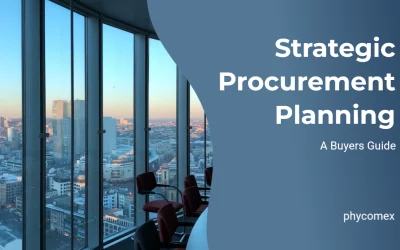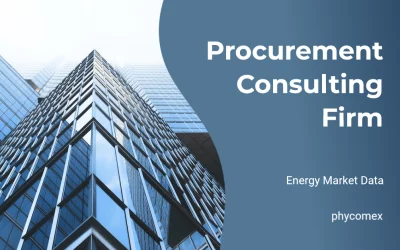Procurement consulting has become an increasingly popular service for businesses looking to streamline their procurement processes and improve their bottom line. As procurement plays a critical role in the success of any organization, it is essential to have a robust and efficient procurement strategy in place.
Procurement consulting can provide businesses with the expertise needed to identify potential suppliers, negotiate contracts, and gain a deeper understanding of the procurement process. In this article, we will explore the benefits of procurement consulting, the skills and requirements needed to become a procurement consultant, and why it is crucial to stay up-to-date in this critical field.
With the help of a procurement consultant, businesses can improve their procurement processes and obtain the best products and services at the best prices. By leveraging the knowledge and experience of a procurement consultant, organizations can identify opportunities for cost savings and optimize their procurement operations.
Additionally, procurement consulting can help businesses navigate the complexities of procurement regulations and compliance, ensuring that all procurement activities are conducted ethically and within legal guidelines. In the following sections, we will delve deeper into the role of procurement consulting and the benefits it can provide to businesses of all sizes.
Key Takeaways
- Procurement consulting can help businesses improve their procurement processes and obtain the best products and services at the best prices.
- Procurement consulting provides strategic advice to businesses and can help navigate procurement regulations and compliance.
- Businesses can gain a better understanding of the procurement process by working with a procurement consultant, and networking opportunities can help identify new opportunities and stay competitive in their industry.
- Procurement consulting can lead to improved efficiency and effectiveness, increased knowledge and expertise, a better understanding of the procurement process, and enhanced networking opportunities, ultimately helping businesses reduce the time and resources required for procurement and gain a competitive edge in the marketplace.
Definition and Role
Procurement consulting plays a pivotal role in advising businesses on the best practices and procedures to procure optimal products and services at the most favorable prices. Procurement consultants provide valuable guidance to organizations in identifying potential suppliers, negotiating contracts, and managing procurement processes. Their expertise enables businesses to streamline their procurement activities, reduce costs, and improve efficiency.
It is important to note that procurement consulting is different from procurement management. While procurement management involves overseeing the daily operations of purchasing goods and services, procurement consulting focuses on providing strategic advice to businesses.
Procurement consultants work closely with procurement managers and other stakeholders to develop procurement strategies that align with the organization’s goals and objectives. By leveraging their expertise, procurement consultants help businesses achieve their procurement objectives and gain a competitive edge in the marketplace.
Benefits
The advantages of utilizing the services of a procurement consultant include improved efficiency and effectiveness, increased knowledge and expertise, a better understanding of the procurement process, and enhanced networking opportunities. By working with a procurement consultant, businesses can streamline their procurement processes, which can lead to increased savings and improved supplier relationships.
The following are some of the specific benefits that businesses can expect when working with a procurement consultant:
- Improved Efficiency and Effectiveness: A procurement consultant can help businesses identify potential suppliers, negotiate contracts, and manage procurement processes. By doing so, businesses can reduce the time and resources required for procurement, which can lead to improved efficiency and effectiveness.
- Increased Knowledge and Expertise: A procurement consultant has extensive knowledge and expertise in procurement processes, which can help businesses gain a better understanding of the procurement process and best practices. This can lead to improved decision-making and better outcomes.
- Better Understanding of the Procurement Process: By working with a procurement consultant, businesses can gain a better understanding of the procurement process, including the various steps involved, the roles and responsibilities of different stakeholders, and the importance of compliance and risk management.
- Enhanced Networking Opportunities: A procurement consultant can help businesses build relationships with suppliers and other stakeholders in the procurement process. This can lead to enhanced networking opportunities, which can help businesses identify new opportunities and stay competitive in their industry.
Steps to Becoming a Consultant
Becoming a procurement consultant requires a series of steps that are essential to acquiring the necessary skills and knowledge to advise businesses on how to procure the best products and services at the best prices.
The first step is to gain experience in procurement, which involves understanding the purchasing processes and terminology. This can be achieved through internships or entry-level positions in procurement departments of organizations.
It is also important to develop a skillset that includes a strong understanding of business operations and how they relate to procurement, as well as excellent communication and organizational skills.
Obtaining certification from an accredited organization such as the International Procurement Institute (IPI) is another essential step to becoming a procurement consultant. This certification demonstrates that an individual has met the requirements for knowledge and experience in the field of procurement.
In addition to certification requirements, networking opportunities are also important for procurement consultants. These opportunities can be found through professional organizations, industry events, and conferences, and they can help procurement consultants build relationships with potential clients and stay up-to-date on the latest changes and innovations in the field.





0 Comments